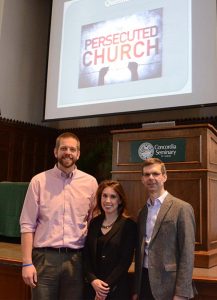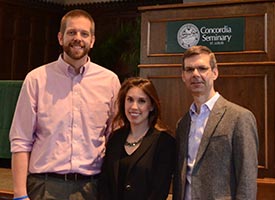By Roger Drinnon
ST. LOUIS — A brother of one of the 21 Coptic Christians reportedly executed by the Islamic State (IS) said, “We are very happy for my brother, because he kept the [Christian] faith until the last moment. I love my brother so much, and I hope to be with him. I ask God to give us patience to endure after his death.”

Religious persecution, including violence against Christians led by militant Islamic groups like IS, has risen dramatically in recent years around the globe. Stephanie Hammond, who served as a U.S. Congress policy adviser and now works at a Christian humanitarian organization, was the featured speaker on this topic during a presentation titled “Global Christian Cleansing: Rising Religious Persecution and What You Should Know,” March 11 at Concordia Seminary here.
“Religious persecution is one of the greatest human-rights issues of our era. The trends of rising religious persecution — including the persecution of Christians — will continue to rise unless we speak out against it,” said Hammond.
She pointed to a Pew Research Study published in February indicating that more than three-fourths of the world’s population now lives under a high level of religious restriction imposed by governments, which also correlates with increasing social hostilities toward Christianity. Christians face harassment in the largest number of countries — 102 — of the 198 countries in the study. A report on the study can be found here.
Hammond said she now sees religious freedom as a declining priority among government officials. She said that in several instances she has visited countries where there are more organizations advocating for lesbian, gay, bisexual and transgender rights than there are for religious liberty.
“Our elected officials and U.S. diplomats engage with foreign governments about human rights, but they are increasingly not prioritizing religious persecution issues,” said Hammond. “The only way it will change is if there is a groundswell of Americans who care about the persecution of our brothers and sisters in Christ.”
During her five years on Capitol Hill, Hammond was staff director of the International Religious Freedom (IRF) Caucus. The IRF Caucus is an 80-member bipartisan coalition of members of Congress who advocate on behalf of persecuted religious minorities worldwide.
In addition to persecution from Islamist extremists in the Middle East and Africa, Hammond noted other disturbing examples, including intensifying violence and oppression against Christians by Hindu nationalists in India, the Chinese and North Korean governments, Burma’s military and by increasingly secular elements within the United States.
“I believe that many Americans are not being taught the importance of religious freedom and how this right was so foundational to the establishment of our country,” she said. “What’s now happening in our nation’s government is the erosion of the belief that religious freedom is a ‘first freedom’ enshrined in the First Amendment of the U.S. Constitution and an ‘inalienable right’ given by God our Creator, as described in the Declaration of Independence.”
For some attending the seminar, Hammond’s presentation was a reminder of what they are encountering or reading about each day, but in more detail. For others, it was a wake-up call.
“So often we can get distracted with our own problems that we forget that so many of our brothers and sisters in Christ around the world are paying for their faith with their lives,” said Tom Schlund, Student Association president at the seminary. “It was really eye-opening to see how many people are facing persecution and the severity of what they are experiencing. “[We must] keep our brothers and sisters in Christ around the world in our prayers, praying that God would continue to strengthen them through His Word and Sacraments and to give them the strength to persevere through these difficult times.”
Hammond referenced Dietrich Bonhoeffer as a historic role model as she called for Lutherans in America to speak out against the escalating atrocities Christians are enduring worldwide.
“Lutherans can become more involved by writing to their members of Congress and senators about why religious freedom matters to them,” she said. “Engage with your elected officials, and ask them to become more involved in religious freedom. If elected officials believe no one cares about religious freedom, they won’t engage.”
Roger Drinnon (roger.drinnon@lcms.org) is manager of Editorial Services for LCMS Communications.
Posted March 20, 2015
